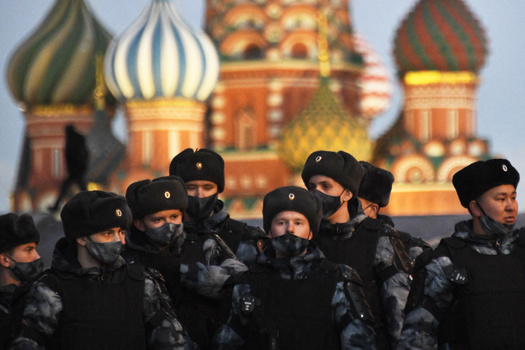
Tapping Article 275 Russia’s Attorney General says providing ‘assistance to foreign states’ constitutes treason. What does this mean for anti-war advocates?
Мы рассказываем честно не только про войну. Скачайте приложение.
On February 27, the Russian Attorney General’s Office promised to “make legal determinations” in the event that any Russian citizen provides “assistance to a foreign state to the detriment of the security of the Russian Federation” during the war with Ukraine. The agency stressed that providing any such assistance will be considered state treason, which carries a punishment of 12 to 20 years. Meduza asked lawyer Ivan Pavlov, head of the human rights group Department One, to explain what this means for Russians who speak out against the war in Ukraine.

Ivan Pavlov
Lawyer, head of Department One
The Attorney General’s statement was made to serve as a warning to people: to reduce the degree of anti-war sentiment, instill fear, and intimidate the people who support or want to find a way to support the Ukrainian side of the conflict. That’s why they chose the odious Article 275 of the Russian Criminal Code — “state treason.”
The article includes three forms of treason. The first is espionage. The second is the disclosure of classified information to a foreigner. And the third is assisting in “activities directed against the security of the Russian Federation.”
Until now, this form of treason has been in “hibernation,” meaning that nobody has been convicted of it. Cases of people being prosecuted for treason in other forms, though, such as espionage and the issuance of state secrets, abound. For example, the majority of cases involving scientists, the case against journalist Ivan Safronov, and the case against the Sochi residents accused of texting their friends in Georgia [ahead of the 2008 war] all involved espionage charges.
A conviction involving this third form of treason would be unprecedented. But we’ve always paid attention to it since, given the vague way it’s worded, and given how widely the concept of the “security of the Russian Federation” is interpreted these days, the article would likely allow security officers to prosecute anyone who collaborates with foreigners.
What’s more, you don’t necessarily have to have given financial support to a foreign military to be charged. Any activity, any positive action toward a foreign element, even before the war, could be grounds for such a charge. Therein lies the danger of this part of the Criminal Code.
When it comes to financial support, meaning actually transferring funds to somebody’s account, and not making secure payments using cryptocurrency, it’s important to pay close attention to where exactly the money is going. If you reach out to a foundation, look carefully at what it spends money on. If you’re supporting the Ukrainian armed forces — contributing to weapons, for instance — then obviously you’re at greater risk of being prosecuted for state treason.
But if you send money to your relatives or to a foundation raising funds for humanitarian aid to civilians or treating the injured, I don’t think there’s a risk there. So your first step should be to carefully examine who you’re sending money to. Weigh the risks yourself and ask yourself whether the collection’s goals could be framed as “activities directed against the security of Russia.”
I don’t think this article could be used to prosecute someone for moral support — for making posts in support of Ukraine on the Internet, for example. In order to tap Article 275 of the Russian Criminal Code, there must be material assistance.
You should also keep in mind that the FSB’s capacity to investigate treason isn’t particularly high. There are usually only about 15-20 cases a year. I don’t believe they can handle a lot of cases, given the whole situation and the limited investigative apparatus they have. But it’s possible they might use a more selective approach, choosing a few dozen high-profile cases and initiating several criminal cases just to warn the public.
Interview by Sasha Sivtsova
Abridged translation by Sam Breazeale
(1) Department One
In July 2021, Team 29, an association of lawyers dedicated to defending people accused of treason in Russia, closed down after the Prosecutor General’s Office linked them with a Czech organization that had been declared “undesirable” in Russia. In November, Team 29 founder Ivan Pavlov, along with four other lawyers who had been a part of the group, was added to the “foreign agents” registry. In December, Pavlov announced the creation of a new human rights group called Department One.
(2) The Safronov Case
On July 7, 2020, federal agents arrested Ivan Safronov on treason charges. According to the FSB, Safronov passed state secrets to Czech intelligence when he was working as a journalist for the business newspaper Kommersant in 2017. Safronov maintains that he isn’t guilty and his defense lawyers are confident that he is being persecuted for his previous journalistic work. While investigators insist that Safronov’s case has nothing to do with his journalism, they did offer him a plea deal in exchange for naming his journalistic sources. Safronov has refused all offered plea bargains.
(3) Oksana Sevastidi
In 2008, Sochi resident Oksana Sevastidi saw some trains carrying military equipment in the city and sent a few text messages to her friend in Georgia about it. In 2015, she was arrested in connection with the texts, accused of state treason, and sentenced to seven years in jail. In March 2017, Vladimir Putin pardoned Sevastidi and her case was subsequently reviewed by the Supreme Court, which reduced her sentence from seven to three years.